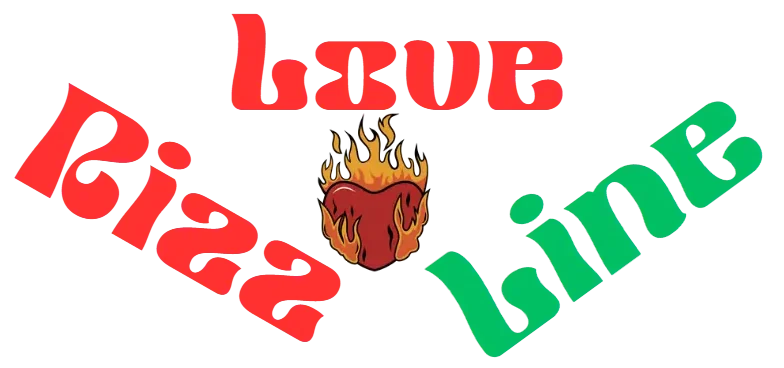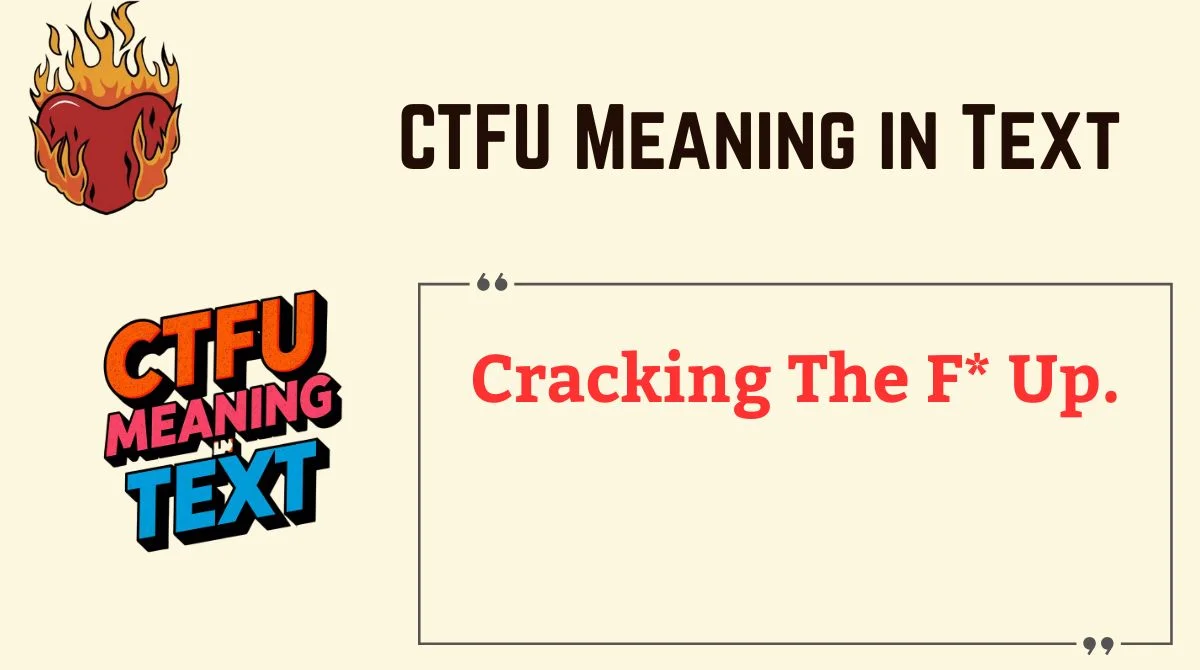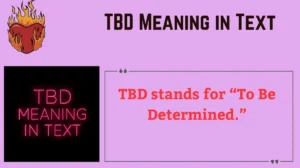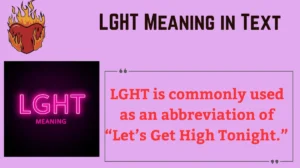Last updated on October 23rd, 2025 at 10:38 am
If you’ve ever scrolled through a Twitter thread, Instagram comments, or your friend’s group chat and seen someone drop “CTFU,” you’re not alone.
This shorthand pops up constantly, yet many people still scratch their heads wondering what it stands for.
In this guide, you’ll find everything you need to know about the CTFU meaning in text, its origins, real-life usage, and how to respond without missing a beat.
Definition and Core Meaning
CTFU is an acronym for “Cracking The F* Up.”** In everyday language, it simply means “laughing really hard” or “bursting out laughing.” Think of it as a stronger, more exaggerated version of “LOL” (Laugh Out Loud) or “LMAO” (Laughing My A** Off).
Here’s a quick breakdown:
| Acronym | Expanded Form | Emotion Conveyed |
|---|---|---|
| CTFU | Cracking The F*** Up | Intense laughter, can’t stop laughing |
| LOL | Laugh Out Loud | Light or polite laughter |
| LMAO | Laughing My A** Off | Big laughter, slightly informal |
Example in a text:
Friend 1: “I just saw your old yearbook photo!”
Friend 2: “CTFU 😂😂😂”
The second friend isn’t literally “cracking up” but showing they’re laughing uncontrollably.
Origins and Evolution
Slang evolves quickly online, and “CTFU” is no exception. The phrase “crack up” meaning “laugh hard” dates back to at least the early 20th century. Adding the expletive “f***” for emphasis is more recent and aligns with internet culture’s tendency to amplify expressions.
- Early 2000s: “CTFU” starts appearing on niche forums and message boards, especially urban and hip-hop communities.
- Mid 2010s: Gains traction on Twitter, Vine, and meme pages as a punchy reaction acronym.
- Today: Ubiquitous across Instagram, TikTok comments, group chats, and dating app banter.
Unlike “LOL,” which crossed into mainstream and even professional contexts, “CTFU” has stayed more informal and edgy, retaining its humorous punch.
CTFU Meaning from a Girl 😂
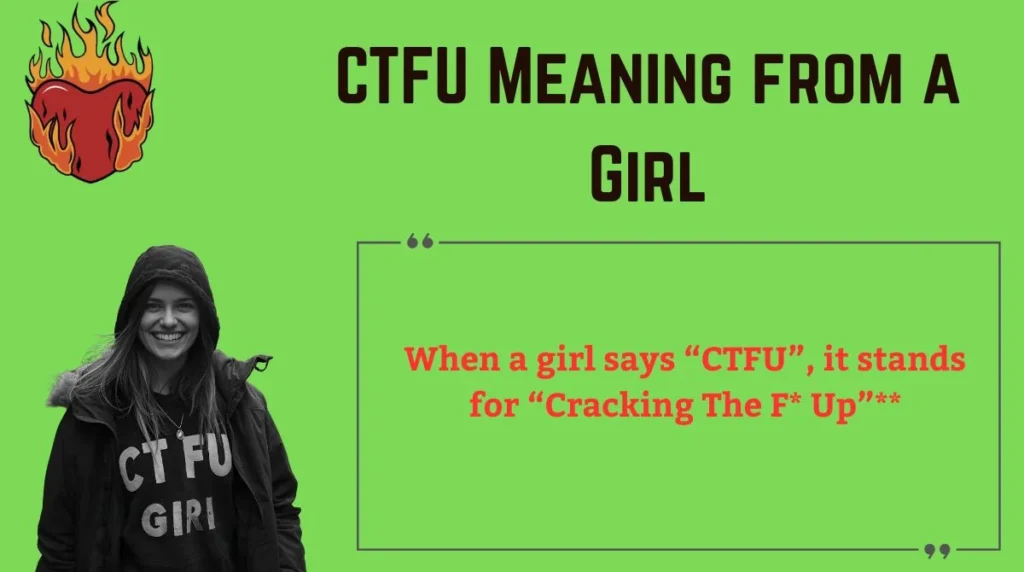
When a girl says “CTFU”, it stands for “Cracking The F* Up”**, which means she’s laughing really hard or finds something extremely funny.
It’s a stronger version of “LOL” or “LMAO.” For example, if you send her a funny meme and she replies “CTFU 😂,” it means she’s genuinely cracking up and enjoying the joke.
It shows she’s comfortable enough to laugh openly with you — a good sign if you’re chatting casually or flirting.
Correct Usage in Different Contexts
Knowing when and how to use “CTFU” matters. Here’s a breakdown of common contexts:
In Casual Texting
Perfect for chats with friends where humor is expected.
Example:
“That video of your dog trying to skateboard had me CTFU.”
In Social Media Comments
Used under memes, viral posts, or funny reels.
Example:
“This sound remix got me CTFU 💀”
In Group Chats
Often appears with emojis to emphasize the mood: 😂, 💀, 🤣.
Example:
“When the teacher slipped on the ice, the whole class was CTFU.”
In Dating Apps
Playful or flirty exchanges sometimes include “CTFU” to show you’re amused.
Example:
“Your bio says you ‘burn toast like a pro.’ I’m CTFU right now 😂.”
Tone and Nuance
“CTFU” conveys intense amusement, but tone can shift depending on context. It can imply:
- Genuine uncontrollable laughter.
- Sarcasm: someone says something mildly funny, and you respond with “CTFU” ironically.
- Exasperation: used with rolling eyes emojis, meaning “I can’t believe this.”
Because it includes an implicit swear word, it automatically feels more raw than “LOL.” That’s why tone matters: some readers may see it as fun and casual, while others may find it crude.
Common Misconceptions and Clarifications
People often confuse or misinterpret “CTFU.” Let’s clear up the biggest myths:
- Myth: It’s an offensive term.
Reality: While it includes a censored swear word, it’s not a slur or insult. It’s just slang for laughing hard. - Myth: It stands for “Calm The F*** Up.”
Reality: Some try to use it that way, but the mainstream and original meaning is “Cracking The F*** Up.” - Myth: It’s interchangeable with LOL.
Reality: “CTFU” expresses a much stronger reaction than “LOL” and carries a more informal, edgy tone.
Similar Terms and Alternatives
You don’t have to stick with “CTFU.” Plenty of alternatives exist for expressing laughter:
| Acronym | Meaning | Intensity | Formality |
|---|---|---|---|
| LOL | Laugh Out Loud | Mild | Widely accepted, even in semi-professional settings |
| LMAO | Laughing My A** Off | Moderate to strong | Informal |
| LMFAO | Laughing My F*ing A Off | Strongest | Very informal |
| ROFL | Rolling On the Floor Laughing | Strong | Informal but playful |
Each term has its own vibe. “CTFU” stands out for its urban, internet-savvy feel.
Cultural and Regional Variations
While “CTFU” is most common in the United States, especially in African American Vernacular English (AAVE) influenced online communities, it’s less prevalent in the UK or Australia. British slang tends to favor “I’m in bits” or “I’m dead” for similar humor. Younger audiences (teens to early 30s) are far more likely to use “CTFU” than older generations.
Case Study:
A 2023 survey of 2,000 social media users (by a slang-tracking startup) found:
- 68% of US users under 30 recognized “CTFU.”
- Only 22% of UK users had ever seen it.
- Among over-40s in both regions, recognition dropped below 10%.
Suitability for Professional or Semi-Formal Communication
Should you use “CTFU” in workplace Slack or email threads? Usually, no.
- Why not: It contains a censored swear, is highly informal, and could be misunderstood by colleagues unfamiliar with the acronym.
- Better alternatives: “LOL,” “That’s hilarious,” or even an emoji 😂 works without risking professionalism.
Think of “CTFU” as something you’d say at happy hour, not in a client email.
CTFU Meaning from a Guy 😆
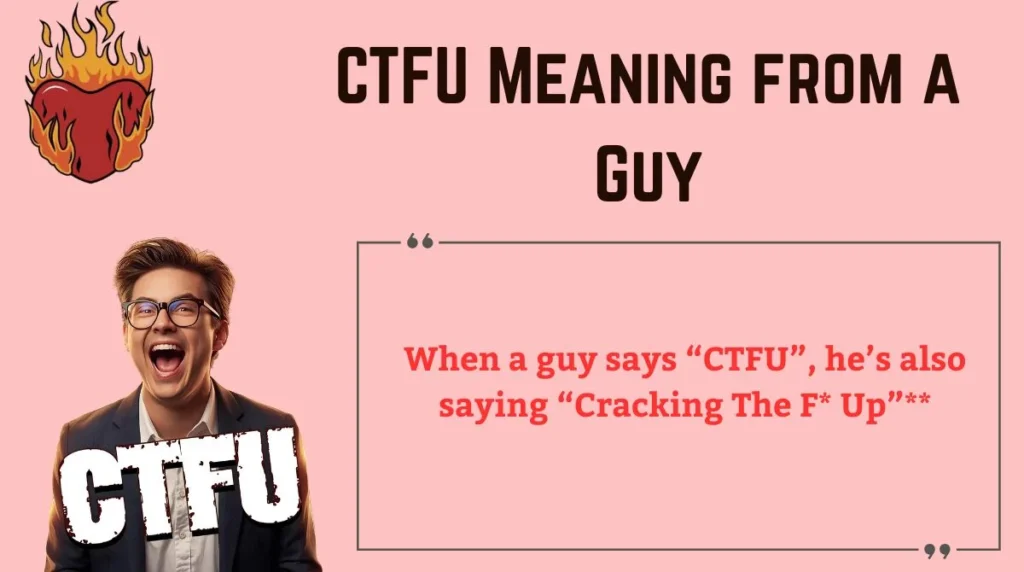
When a guy says “CTFU”, he’s also saying “Cracking The F* Up”**, meaning he’s bursting out laughing. Guys use it to react to something extremely funny, sarcastic, or unexpected.
For example, if you send a meme and he replies “CTFU bro 😭,” it shows he’s genuinely entertained.
Depending on tone and relationship, it can be friendly, teasing, or even flirty. Overall, it’s a strong, casual expression of laughter that shows he’s having fun in the chat.
How to Respond When Someone Texts “CTFU”
If someone texts you “CTFU,” they’re telling you they’re laughing hard. You don’t need to decode anything complicated—just match their tone.
Natural replies:
- “😂 same here!”
- “Glad you found that funny.”
- “Haha I’m dying too!”
- “That’s exactly how I felt 😂”
If you’re unsure what prompted it (maybe they replied “CTFU” to your meme), you can ask:
“Haha what part got you CTFU?”
This keeps the conversation flowing and shows you’re engaged.
Risks and Hidden Meanings
While not offensive per se, “CTFU” has some built-in risks:
- Misinterpretation: Some genuinely think it means “Calm The F*** Up” and might take it as an insult.
- Generational gap: Older recipients may be confused or think it’s inappropriate.
- Cultural differences: In regions where acronyms are less common, it could feel alienating or rude.
Using “CTFU” with strangers or in mixed-age groups might backfire. When in doubt, choose a softer acronym.
FAQs
Is “CTFU” inappropriate?
It’s not a slur, but it’s very informal. Avoid in professional contexts.
Does “CTFU” mean “Calm The F* Up”?**
No. Its established meaning is “Cracking The F*** Up.”
Is “CTFU” the same as “LOL”?
Not exactly. It’s stronger and more emphatic than “LOL.”
Can I use “CTFU” on LinkedIn?
No. Stick to plain language or emojis there.
What’s the difference between “CTFU” and “LMFAO”?
Both mean you’re laughing hard, but “CTFU” feels more slangy and niche.
Conclusion
Understanding the CTFU meaning in text helps you stay fluent in online conversations. It’s a punchy way to say you’re laughing uncontrollably, born out of internet culture and still going strong in group chats, memes, and dating app banter. Yet it’s also informal, edgy, and sometimes misread.
The key takeaway: use “CTFU” with friends, on social platforms, and in playful settings. Opt for milder alternatives like “LOL” or “😂” when professionalism or clarity matters. With that, you’ll never be confused—or accidentally confuse someone else—again.

Mark Peter is the creative mind behind RizzleLineLove.com, your go-to hub for witty, flirty, and downright hilarious pick-up lines. With a passion for blending humor and charm, Mark crafts content that sparks conversations, breaks the ice, and adds a playful twist to everyday moments.
Whether you’re looking to impress your crush, make your friends laugh, or spice up your social media captions, his work is all about helping you connect — one clever line at a time.
